牛津英语9AU2L1
- 格式:doc
- 大小:38.50 KB
- 文档页数:3
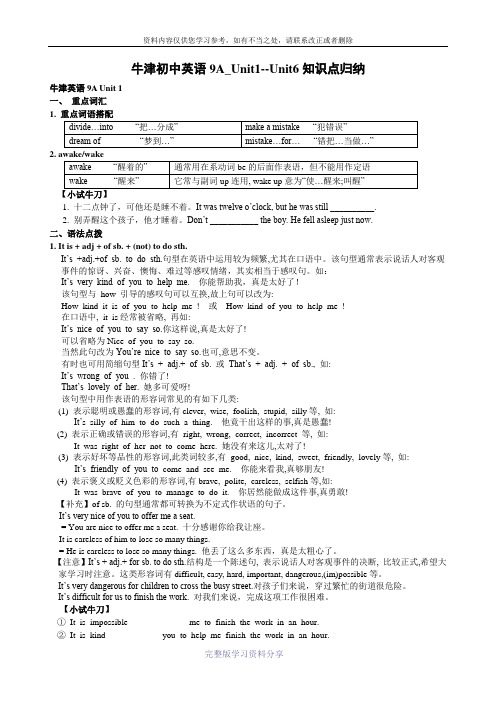
牛津初中英语9A_Unit1--Unit6知识点归纳牛津英语9A Unit 1一、重点词汇1.【小试牛刀】1. 十二点钟了,可他还是睡不着。
It was twelve o’clock, but he was still __________.2. 别弄醒这个孩子,他才睡着。
Don’t ___________ the boy. He fell asleep just now.二、语法点拨1. It is + adj + of sb. + (not) to do sth.It’s +adj.+of sb. to do sth.句型在英语中运用较为频繁,尤其在口语中。
该句型通常表示说话人对客观事件的惊讶、兴奋、懊悔、难过等感叹情绪,其实相当于感叹句。
如:It’s very kind of you to help me. 你能帮助我,真是太好了!该句型与how 引导的感叹句可以互换,故上句可以改为:How kind it is of you to help me ! 或How kind of you to help me !在口语中, it is经常被省略, 再如:It’s nice of you to say so.你这样说,真是太好了!可以省略为Nice of you to say so.当然此句改为You’re nice to say so.也可,意思不变。
有时也可用简缩句型It’s + adj.+ of sb. 或That’s + adj. + of sb., 如:It’s wrong of you . 你错了!That’s lovely of her. 她多可爱呀!该句型中用作表语的形容词常见的有如下几类:(1) 表示聪明或愚蠢的形容词,有clever, wise, foolish, stupid, silly等, 如:It’s silly of him to do such a thing. 他竟干出这样的事,真是愚蠢!(2) 表示正确或错误的形容词,有right, wrong, correct, incorrect 等, 如:It was right of her not to come here. 她没有来这儿,太对了!(3) 表示好坏等品性的形容词,此类词较多,有good, nice, kind, sweet, friendly, lovely等, 如:It’s friendly of you to come and see me. 你能来看我,真够朋友!(4) 表示褒义或贬义色彩的形容词,有brave, polite, careless, selfish等,如:It was brave of you to manage to do it. 你居然能做成这件事,真勇敢!【补充】of sb. 的句型通常都可转换为不定式作状语的句子。
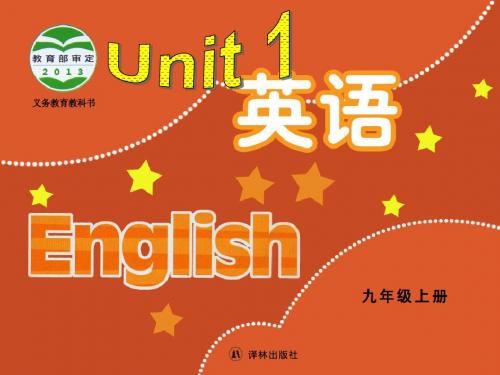
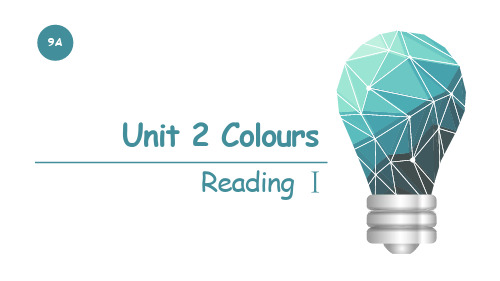

牛津初中英语9A同步测试(Unit1-2)(Unit1-2)听力部分A)回答问题(6分)( ) 1.A. Last year B. every year C. for ten years( ) 2.A. Running B. Surfing C. Skiing( ) 3.A. A teacher B. tall C. Li Lei’s father( ) 4.A. By plane B. By train C. By bus( ) 5.A. Yes. please B. You are welcome C. All right( ) 6.A. Yes. I am B.No. I haven’t C. Last monthB)对话理解(8分)( ) 7.Where are they talking?A. At a cinemaB. At a bus stopC. In a shop( ) 8.how old is the man now?A. 15B. 20C. 25( ) 9.What does the man mean ?A. He’ll buy another kindB. They don’t have any more teaC. They’ll get some more tea( ) 10.Why doesn’t the woman want to learn English?A. She is illB. English is difficult for herC. She will give it up ( ) 11.Whose bike is it ?A. Peter’sB. Jim’sC. The girl’s( ) 12. Who does the boy want to speak to ?A.MaryB. LucyC. Lily( ) 13. What is the woman going to drink ?A. TeaB. MilkC. Water( ) 14. How many times has the girl been to the Great Wall?A. Four timesB. Three timesC. Only twiceC)短文理解(10分)( ) 15. The woman worries that there are a lot of bad programmes ________.A. in filmsB. on the InternetC. on TV( ) 16. According to the listening, many students wear glasses because they ____.A. study too hardB. read many booksC. watch too much TV ( ) 17. Which of the following is true?__________.A.The writer’s children have the same idea with their motherB.Reading books can make children think moreC.There are a lot of good programmes for children on TV( ) 18. At last , the woman decided to _______.A. sell the television setB. write more booksC. buy a pair of glass ( ) 19. This passage is ________.A. an interesting storyB. a news report on TVC.about a mother’s mind or idea笔试部分一、选择题。
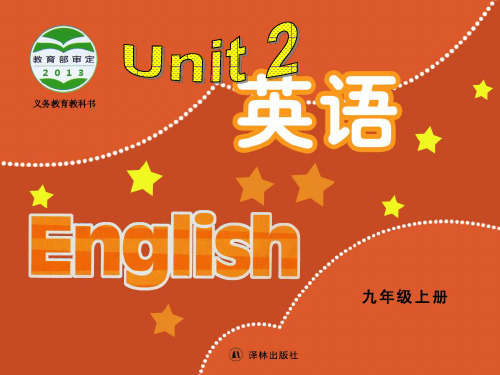
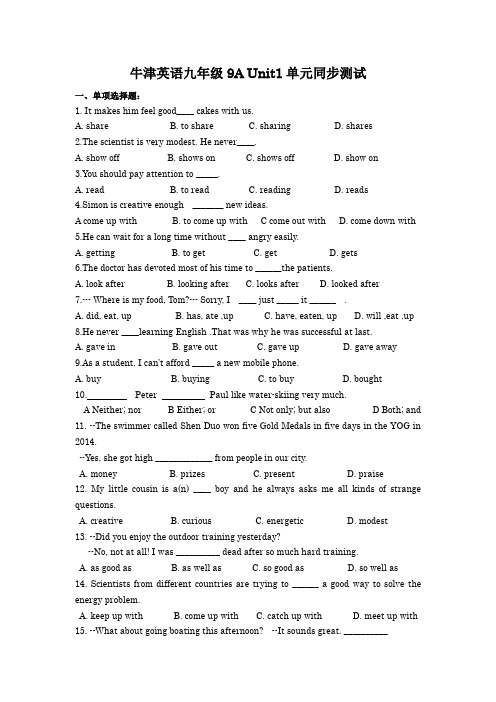
牛津英语九年级9A Unit1单元同步测试一、单项选择题:1. It makes him feel good____ cakes with us.A. shareB. to shareC. sharingD. shares2.The scientist is very modest. He never____.A. show offB. shows onC. shows offD. show on3.You should pay attention to _____.A. readB. to readC. readingD. reads4.Simon is creative enough _______ new ideas.A come up with B. to come up with C come out with D. come down with5.He can wait for a long time without ____ angry easily.A. gettingB. to getC. getD. gets6.The doctor has devoted most of his time to ______the patients.A. look afterB. looking afterC. looks afterD. looked after7.--- Where is my food, Tom?--- Sorry, I ____ just _____ it ______ .A. did, eat, upB. has, ate ,upC. have, eaten, upD. will ,eat ,up8.He never ____learning English .That was why he was successful at last.A. gave inB. gave outC. gave upD. gave away9.As a student, I can’t afford _____ a new mobile phone.A. buyB. buyingC. to buyD. bought10. Peter Paul like water-skiing very much.A Neither; norB Either; orC Not only; but alsoD Both; and11. --The swimmer called Shen Duo won five Gold Medals in five days in the YOG in 2014.--Yes, she got high _____________ from people in our city.A. moneyB. prizesC. presentD. praise12. My little cousin is a(n) ____ boy and he always asks me all kinds of strange questions.A. creativeB. curiousC. energeticD. modest13. --Did you enjoy the outdoor training yesterday?--No, not at all! I was __________ dead after so much hard training.A. as good asB. as well asC. so good asD. so well as14. Scientists from different countries are trying to ______ a good way to solve the energy problem.A. keep up withB. come up withC. catch up withD. meet up with15. --What about going boating this afternoon? --It sounds great. __________A. Either take the lead or fall behind.B. I can't agree with you more.C. You can't be too careful.D. It's better to be safe than sorry.二、完形填空:"Look, it's Baldy!" A boy shouted in my direction across the playground. 1 I was used to it because of the scars(伤疤)on my 2 , it was still horrible to hear. I sighed (叹气) as I headed back to the class.When I was just 20 months old, I suffered serious 3 after a bowl full of hot oil fell on my head. I was sent to hospital and had to stay there for weeks while the doctors 4 to save my life. "Holly's very 5 to be alive," they told Mum and Dad. "But she'll be left with scars on her head, and of course her hair won't grow there."As a child, I cared much about my scars, so I 6 wore a scarf to cover them up when I left home .If I didn't, people would call me horrible names like Baldy. Although my friends were always comforting me , they never 7 understood how it felt.Then through the hospital I was 8 to a children's burns camp, where children like me can get any help. There, I 9 14-year-old Stephanie, whose burns are a lot more serious than mine. But she is so 10 that she never lets anyone put her down. "You shouldn't 11 what people say about what you look like because we're not different from anyone else, Holly," she 12 me, "And you don't need to wear a scarf because you look great 13 it!" For the first time in my life I could speak to someone who'd been through something 14 . So weeks later, at my 13th birthday party, encouraged by her bravery, I gave up my scarf and showed off my scars. It felt amazing not having to hide away behind my scarf.Now, I am 15 of what I look like and much happier, because I have realized it is your personality that decides who you truly are.1. A. As B. When C. Although D. While2. A. head B. ear C. face D. back3. A. hunger B. cold C. loss D. burns4. A. learned B. tried C. returned D. decided5. A. happy B. lucky C. lonely D. poor6. A. never B. usually C. seldom D. hardly7. A. correctly B. nicely C. easily D. really8. A. promised B. introduced C. reported D. carried9. A. met B. organized C. remembered D. caught10. A. honest B. strong C. active D. young11. A. write down B. agree with C. pass on D. listen to12. A. promised B. encouraged C. ordered D. calmed13. A. in B. for C. without D. beyond14. A. similar B. strange C. hard D. important15. A. sick B. sorry C. tired D. proud三、阅读理解:AAs an English, I can speak three languages—English, German and French, so do you think the British people are very good language learners? The fact is that they aren't. Some statistics(数据) from the survey done by the European Commission(欧盟委员会) showed that 62% of the British people only speak English. 38% speak at least one foreign language and 18% speak two or more. Compared with the British people, 56% of the people in other European countries speak at least one foreign language and 28% speak two or more. From this you can see that the British people are famous for not speaking foreign languages and that they are not good language learners in Europe.And the survey also showed that English is the most widelyspoken foreign language. Many European people can have a conversation in English. That's why many people don't think it is necessary to learn a foreign language.In Britain, students are not required to learn a foreign language. That means learning a foreign language is only an option at school. In UK schools it is common for children to start learning a foreign language at 11 and many of them give it up at 14.So why don't students continue learning foreign languages at school? Because they think it is more difficult to get good marks in languages than in other subjects such as science or history.To solve this situation, the British government is looking for different ways to improve language learning at school. One way is to start learning it at a much younger age. Another one is to give school children more choices.Changing the British attitude(态度) to learning foreign languages may be a hard task but the government decides to try!1.Which country does the writer come from?A. America.B. China.C. Britain. D,USA2.Which of the following about the British people is TRUE?A. They are good language learners.B. 62% of them speak two or more languages.C. More than half of them only speak English.D. 10% of them speak five or more languages.3.According to the passage, students in Britain prefer to learn ________.A. science or GermanB. history or GermanC. science or historyD.maths4.In Paragraph 4, “an option” means ________.A. a choiceB. a gameC. a mistakeD.a book5.What is the best title of the passage?A. Speaking EnglishB. Foreign Language Learning in UKC. Schools in UKD. Speaking JapaneseBWhat colour is your name? What colour is Wednesday? These questions might sound strange to most people, but some can answer right away. One person says her name is the colour red. For another person, Wednesday is blue. These people have a condition called synesthesia(共同感). This means they experience two senses at the same time. For these people, the senses of smell, sound, sight, touch, and taste are not separate. They might see and also hear colours, for example, or hear as well as feel sounds.The most common form of synesthesia is to hear sounds as colours, A person with synesthesia might hear the number three as blue or the letter D as red. Someone might always see green upon hearing the word April. Another person might see different colours while listening to music. Some people also taste colours. To one person, beef might taste blue and to another, yellow. Some people experience feelings in colour. For example, one person with synesthesia reports feeling pain as the colour orange.Another form of synesthesia is to experience sounds or tastes as shapes. Somepeople see music as squares and circles. Some people taste a sweet as a smooth ball. There are other forms of synesthesia, as well. For one man, different words have different tastes. Some words taste like pork, others taste like potatoes or eggs. Synesthesia is not a common condition. Perhaps only one person in every 5,000 has it. For these people, the everyday world can be a colourful and interesting place.6. What is this passage mainly about?A. An unusual condition.B. People who like colour.C. The colour of pain.D. Music and art.7. How many people probably have synesthesia?A. Only 5,000 in the world.B. One out of every 500.C. About 5 million.D. One out of every 5,000.8. Which is the most common form of synesthesia?A. Experiencing tastes as shapes.B. Experiencing sounds as colours,C. Experiencing words as tastes.D. Experiencing music as shapes9.Which of the following is NOT an example of synesthesia?A. Feeling pain in red.B. Tasting beef as green.C. Feeling warm in April.D. Seeing music as squares.CWhy is it that some people seem to learn several languages without any effort,while for others learning just one foreign language is neither enjoyable nor successful? What makes learning a new language so easy for some and so difficult for others?We each have our own preferred way of learning as a result of our cultural and educational backgrounds and our personalities.Experts have identified different learning styles.Visual Learners usually enjoy reading and prefer to see an image of the words they are learning.They like looking at pictures and flash cards.Auditory Learners,on the other hand,prefer to learn by listening.They enjoy conversations and talking to others.They don’t need to see words written down.One study revealed that Japanese students tend to be Visual Learners,while English-speaking Americans,prefer the auditory learning style.Some people like to learn by using their hands to touch objects,while others like to move around and need frequent breaks from sitting at a desk.There are Analytical Learners,meaning they enjoy understanding how the language works.They love studying grammar rules and like to focus on details,whereas Global Learners are more interested in communicating their ideas and are not worried about whether what they say is grammatically correct.In spoken English,the Japanese tend to be Reflective Learners.They think carefully before they speak to ensure their message is accurate.They do not make so many mistakes but their communication is slower.European learners tend to be more Impulsive Learners.They speak more fluently and worry about how well they are communicating rather than how many mistakes they are making.So,to do well in a language,you should identify your style and try to find a class that will teach you the way you want to learn.For example,if you are a Reflective Learner,you may not do so well in a purely conversational class and as an Auditory Learner,you probably don’t want to do so much reading.In fact if you are an Auditory Learner,you are probably not enjoying yourself right now!10.The passage mainly talks about .A.the difficult learning styles of some peopleB.the easy learning ways of other peopleC.the different learning styles of the JapaneseD.the different learning methods of all the people11.Which of the following phrases isn’t connected with the learning style?A.The way people are taught to learn a language.B.The place where people are from.C.The size of people.D.The kind of person people are.12.Visual Learners like to .A.see thingsB.touch thingsC.hear thingsD.do things13.Auditory Learners like to .A.hear thingsB.buy thingsC.destroy thingsD.paint things14.Analytical Learners .A.are similar to Global LearnersB.never worry about mistakesC.love to study detailsD.do well in conversation四、根据句意或首字母填合适的单词:1. Lang Lang is a (天生的) pianist and of course, his hard work also helps him achieve such great success.2. Jim’s father is a (总的) manager in a big computer company.3. Li Hong came first in the 100-metre (赛跑) in the sports meeting last week.4. The young man is trying to be a (先锋) in the field of high technology.5. The product of this company has reached the international (标准), so it sells well all over the world.五、用所给单词的适当形式填空:1. Jack always plays basketball for hours. He is very ________(energy).2. Sam often comes up with different kinds of ideas. He is ________(create).3. Billy likes asking questions. He is ________(cure) about everything.4. Millie is very ________(organize). She can plan everything well by herself.5. Linda knows a lot about Chinese history, but he never shows off. He is ________( modest).六、完成句子:1. Hobo,你把我的早餐吃完了!_________________________________________2.你能想出些好的主意吗?_________________________________________3.昆明的天气一年到头既不太冷也不太热。
9A U1U2知识要点小结姓名:__________ 班级:____________一、重点单词(词性变化)1.gold n.金– golden adj. 金色的2.doubt v. 不能肯定,对…无把握– doubtful adj. 可疑的,不能确定的-undoubted adj. 确认的,无疑的3.real adj. 真的,正宗的– really adv. 真的– realize v. 意识到4.truth n. 真相,实情– true adj. 正确的– truly adv. 真实地5.solve v. 解决,处理– solution n.解决方案6.less det. 较少的,更少的(与不可数名词连用)- 原级little –最高级least7.certain adj. 确定的,肯定的– certainly adv. 确定的– certainty n. 必然,确定-uncertain adj. 无常的– uncertainly adv. 不确定地– uncertainty n.不确定8.prison n. 监狱– prisoner n. 囚犯9.hit v. 击、打–过去式/过去分词hit10.brave adj. 勇敢的,无畏的– adv. bravely11.correct adj. 正确的/ v. 改正– correctly adv. – correction n. – incorrect adj. 不正确的12.mistake n. 错误/ v. 弄错–过去式mistook –过去分词mistaken13.consider v. 认为,觉得– consideration n. 考虑14.humour n. 幽默– humorous adj. 幽默的,滑稽的15.invitation n. 邀请– invite v. 邀请16.pleasure n. 乐事– please v. 使喜欢,使满意– pleased adj. 满意的17.achievement n. 成就,成绩– v. achieve 取得,获得18.universe n. 宇宙– universal adj. 普遍的,通用的,宇宙的19.obey v. 服从,遵守– disobey v. 违反,不服从20.exactly adv. 精确地,准确地– exact adj. 准确的,精确的21.action n. (故事,戏剧等中的)情节– act n. / v. 行为,行动二、同义词(同义词组)1.doubt = not sure 不确定2.solve = work out =deal with = do with 解决3.displace = take place of 取代4.certain = sure 确信5.mistake = error 错误6.be happy with=be satisfied with=be pleased with 对...满意7.think about=consider 考虑8.think of an idea = come up with an idea 想出/想到一个主意9.trick sb.=play a joke on sb.捉弄某人10.be amazed at= be surprised at 对....吃惊11.avoid doing sth. = prevent sth. from happening 避免做某事12.lecture = speech 演讲13.tonight = the night of today 今晚14.trust = believe in 信任,信赖15.reduce = ma ke less in … 减少,缩小16.consider sb. as = regard sb. as 把某人看作......17.learn ...by heart=remember=memorize牢记在心,背下来18.without difficulty=easily轻而易举二、重点短语1.seem adj. to do sth. 做某事看起来是...2.take off 带走,脱掉,飞机起飞3.fill A with B 用B装满A4.get into 进入到...里get up 起床get on 上车get off 下车5.run over 溢出6.make sure 确保7.go straight to 径直走向8.lose weight 减肥put on weight 增肥9.run into 流入,进入10.send sb. to prison 把某人关进监狱11.tell the truth 讲实话tell a lie 说谎12.cut ...in half 把....切成两半cut up切碎13.let/have/make sb do sth.使某人做某事14.have sth. done某事被做15.allow sb. to do sth.允许某人做某事allow doing sth. 允许做某事be allowed to do sth.被允许去做某事16.speak to sb. 和某人讲话speak +语言talk to sb. 和某人谈话17.have a try试一试18.a sense of humor幽默感19.receive invitation收到邀请invite sb. to do sth.邀请某人去做某事20.at the university 在大学go to university 去上大学21.It’s a pleasure to do sth.做某事是一件快乐的事22.let sb. down 让某人失望23.be guided to被带领到24.take a seat坐下25.have no idea 丝毫不知道26.be in trouble 处于困境,倒霉out of trouble 摆脱困难27.It is adj. for sb. to do sth.做某事对于某人来说是...28.It is adj of sb. to do sth.做某事对于某人来说是29.a series of 一系列30.side by side肩并肩31.from time to time不时地,有时地。
新译林版牛津英语9A全册要点总结(期末复习)9A Unit1Know yourself一、重点短语序号页码汉语英语16吃光eat up26看一看have/take a look36和某人分享某物share sth.with sb.47使…保持井然有序keep…in order57炫耀show off67想出(主意);追上,赶上come up with77整天all day long88搜索;寻找search for98放弃give up108一天又一天day after day118或者…或者…either…or…128落后fall behind138接受新挑战take on new challenges148任何时候any time159与…连接,连接connect to/with169注意…pay attention to179不但…而且…not only…but also…189事实上in fact199把….投入到…devote…to…2016把…分成…divide…into…2118同意(某人的)看法agree with sb.二、经典句子all her(P7)她把她所有的东西弄得井井有条。
a good accountant.(P7)我和我父母亲都认为我不能成为一名好的会计员。
3.Wu Wei,the young artist,has impressed the whole country his creative work.(P8)他的富有创造力的作品给全国人民留下深刻的印象。
4.All of us know that it’s necessary to detail.(P9)我们都知道有必要注意每个细节。
5.Carelessness will be a to patients.(P9)粗心不但对我们自己而且对病人来说会是一种疾病。
三、单元语法【并列句】两个或两个以上的简单句用并列连词连在一起构成的句子,叫做并列句,其基本结构是“简单句+并列连词+简单句”。
学员姓名:年级:初三课时数: 3 辅导科目:英语学科教师:T初三上U1,U2知识点复C U1,U2语法点复习T 综合训练授课类型习授课日期及时段教学内容Lead-in :What month do soldiers hate?(军人憎恨什么月?)答案March。
(行军。
)课本单词复习:(红色加粗字是学生版上面没有的内容)1. Troy n. 特洛伊城Trojan adj. n. 特洛伊的;特洛伊人2. secure adj. 安全的security n.安全securely adv.安全地(拓展内容)safe adj安全的safety n安全safely adv安全地save v拯救3. include v.包括including prep. 包括included adj.包括的4. appear v出现disappear v消失appearance n出现,外表disapparance n.消失5. fright n害怕frighten v.使…..害怕frightened adj感到受惊的frightening adj令人害怕的7. succeed v. 成功success n.成功successful adj.成功的successfully adv.成功地succeed in doing sth = be successful in doing sth = manage to do = be able to do8. wood n.木头,木材,(复数:树木)wooden adj. 木制的wool n.羊毛woolen adj.羊毛的9. Greece n.希腊Greek adj. n.希腊的;希腊人10. pull v. n.拉pull …into push v. n.推drag v. n.拽(dragged)11. except 除了(不包括)except for 除了(整体和局部)except that 除了(加句子)besides 除了(包括)beside 在。
英语(九年级上册)
Unit 2 Colours
Comic strip& Welcome to the unit
I. Teaching aims and learning objectives
By the end of the lesson, students should be able to:
1. name different colours;
2. know the different colours in a rainbow;
3. talk with their partner about colours.
II. Teaching contents
1. New words and phrases: indigo, violet, rainbow, try on, look good on sb., in the sky
2. New structures: There’s nothing wrong with pink.
I’m not sure if it looks good on you.
Do you know how many colours there are in the rainbow?
III.Focus of the lesson and predicted area of difficulty
Talk about colours around us in English.
IV. Teaching procedures
Comic strip
Step 1 Lead-in
1. Listen to a song about colours
2. Free talk
What colour do you like to wear? Why?
【设计意图:通过关于颜色的歌曲,谈论喜欢穿的颜色导入新课,使学生快速进入本课话题。
】Step 2 Presentation
1. Watch a video and answer questions
T: Different people like to wear different colours. What colour does Eddie like to wear? Let’s watch a video and answer the questions.
(1) Which colour does Eddie want to wear, pink or blue? Why?
(2) Why does Hobe laugh?
Step 2 Practice
Read and act out.
Step 3 Production
Tell a story
This morning, Hobo showed me two pieces of clothing. One was pink and the other was blue. He asked me which I wanted to w_______. I thought blue was b________ than pink. Pink is a g________ colour while blue is for boys. Hobo didn’t a________ with me. He thought there was n________ wrong with pink. At that time, I didn’t know what he meant. He let me choose first and helped me try it on. How k________ Hobo was today! But when I p________ on the blue one, I found it was a girl’s d________! Hobo looked at me and l_________ out of breath. He said that he was not sure if blue looked g________ on me. I was very angry! What a bad e-dog Hobo is! 【设计意图:让学生模仿Eddie的语气,讲述发生在自己身上的故事,使其在表达中运用所学语言知识。
】
Welcome to the unit
Step 1 Lead-in
Guess a riddle (谜语)
T: We can see colours everywhere in our daily lives. Today I’ll show you a colourful thing. Guess what it is.
【设计意图:通过猜谜,引出生词,激发学生学习Welcome to the unit的兴趣。
】
Step 2 Presentation
1. Learn about colours in a rainbow
2. Present new words: violet, indigo
T: What colors does a rainbow have? Please name them in order.
red—orange—yellow—green—blue—violet—indigo (借助图片呈现violet和indigo)
Step 3 Practice
1. Quick reaction
What colours are the letters?
【设计意图:通过快速反应游戏,让学生学会区分blue、violet、indigo三种颜色,并在游戏中进一步巩固生词。
】
2. Finish Part A on P21
3. Listen to the conversation in Part B and read after the tape
4. Work in pairs and talk about colours around you
【设计意图:提供生活中与颜色相关的图片,创设情境,让学生模仿课本对话谈论颜色,培养他们的语言运用能力。
】
Step 4 Production
Have a discussion
1. How do you feel when you see such colorful things?
2. What will our life be like if there are no colours?
T: The world is full of colours. It is so beautiful. Without colours, the world would be a dull place. So we should love the world and try to protect it.
V. Homework
1. Remember the new words, phrases and structures;
2. Search for more information about colours;
3. Preview Reading.。